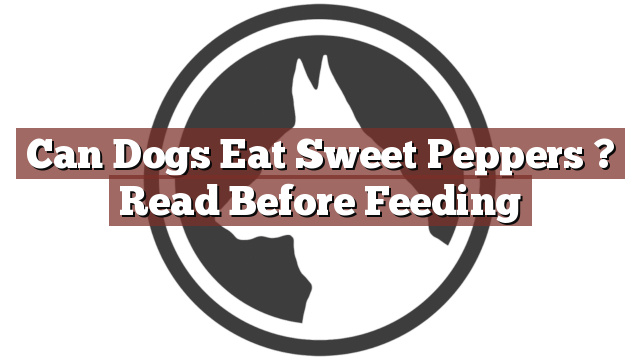Understanding Your Dog’s Dietary Needs
As pet owners, it is crucial for us to understand our dog’s dietary needs to ensure their overall health and well-being. While dogs are primarily carnivores, their bodies can also benefit from certain fruits and vegetables. However, it is essential to be aware of which foods are safe and suitable for our furry friends. One such food that often raises questions is sweet peppers. Can dogs eat sweet peppers? Let’s delve into this topic and find out.
Can Dogs Eat Sweet Peppers? Read Before Feeding
Can dogs eat sweet peppers? The answer is yes. Sweet peppers, also known as bell peppers, are generally safe for dogs to consume in moderation. These colorful vegetables are packed with vitamins A, C, and E, which can provide various health benefits for your canine companion. Furthermore, sweet peppers are low in calories and fat, making them a healthy addition to your dog’s diet.
However, before you start feeding sweet peppers to your dog, there are a few factors to consider. Firstly, make sure to remove the seeds and stem of the pepper, as they can pose a choking hazard or cause digestive upset. It is also essential to introduce this new food gradually to your dog’s diet to avoid any potential stomach upset or allergic reactions. Always monitor your dog’s response to new foods and consult with your veterinarian if you have any concerns.
Pros and Cons of Feeding Sweet Peppers to Dogs
Feeding sweet peppers to your dog can have several benefits. As mentioned earlier, sweet peppers are rich in vitamins A, C, and E. These vitamins contribute to a strong immune system, healthy skin and coat, and promote overall well-being. Additionally, the crunchiness of sweet peppers can aid in maintaining your dog’s dental health by reducing plaque buildup.
Despite the advantages, there are some potential drawbacks to consider. Some dogs may have difficulty digesting peppers, especially if they have a sensitive stomach. If you notice any signs of gastrointestinal distress, such as diarrhea or vomiting, it may be best to discontinue feeding sweet peppers. Additionally, if your dog has a pre-existing medical condition, it is always wise to consult your veterinarian before introducing any new foods into their diet.
Conclusion: Considerations for Feeding Sweet Peppers to Your Dog
In conclusion, sweet peppers can be a nutritious and flavorful treat for your canine companion. However, it is crucial to feed them in moderation and prepare them properly. Always remember to remove the seeds and stem before offering sweet peppers to your dog and introduce them gradually to their diet. Monitor your dog’s response and consult with your veterinarian if you have any concerns or notice any adverse reactions. By being cautious and informed, you can safely incorporate sweet peppers into your dog’s diet and provide them with a tasty and healthy snack option.
Thank you for taking the time to read through our exploration of [page_title]. As every dog lover knows, our furry friends have unique dietary needs and responses, often varying from one canine to another. This is why it's paramount to approach any changes in their diet with caution and knowledge.
Before introducing any new treats or making alterations to your dog's diet based on our insights, it's crucial to consult with a veterinarian about [page_title]. Their expertise ensures that the choices you make are well-suited to your particular pet's health and well-being.
Even seemingly harmless foods can sometimes lead to allergic reactions or digestive issues, which is why monitoring your dog after introducing any new food item is essential.
The content provided here on [page_title] is crafted with care, thorough research, and a genuine love for dogs. Nevertheless, it serves as a general guideline and should not be considered a substitute for professional veterinary advice.
Always prioritize the expert insights of your veterinarian, and remember that the health and happiness of your furry companion come first.
May your journey with your pet continue to be filled with joy, love, and safe culinary adventures. Happy reading, and even happier snacking for your canine friend!

